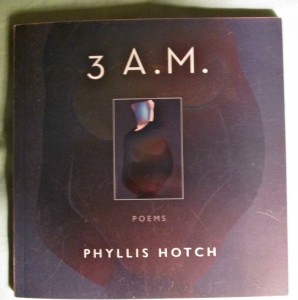“3 A.M.,” writes Marjorie Agosín in her beautiful Introduction to Phyllis Hotch’s newest collection of poetry, “is a book that speaks of the altered mind, due to aging and disease, as well as a book that celebrates the sacredness of being alive, of reflecting about solitude and beauty, landscape and renewal.” In it, “The poet invites us to accompany her on a most dangerous journey, the one of life itself and its infinite and finite possibilities.”
Since the book’s publication last year by 3: A Taos Press, Phyllis, now 86, has been widely celebrated in her adoptive home of Taos in print and in person – giving readings at various prominent venues, such as SOMOS (the Society of the Muse of the Southwest) and the TJC (Taos Jewish Center). Phyllis has been called “a leading light in the community.” In short, she’s a star.
Phyllis and her husband Sy, who passed away earlier this year, came to Taos in 1989 to retire, after having lived, worked, and raised their three children in Massachusetts. Phyllis had taught high school English there for 21 years, so she was keen to become involved in Taos’s lively literary community upon her arrival. When she and Sy learned about the then-new nonprofit SOMOS, they joined the board; and Phyllis served as the organization’s president for the next 15 years.
Among the SOMOS programs that Phyllis helped initiate is the Youth Mentorship Program that has lasted for over 20 years.
I sat down with Phyllis on a mild afternoon not so long ago at her home in El Prado, overlooking a lush valley and the majestic Taos Mountain, to talk about her newest book and what keeps her going strong.
“I love this community,” she said. “The people are immensely creative, open-hearted, and nonjudgmental. So at this stage of my life, especially, I want to be a good role model. I want to be useful and be available to younger people. I want to give back.”
Phyllis wrote many of the poems in 3 A.M. during the years Sy was declining from Alzheimer’s disease. This one, “Decline,” though short, is filled with love and tinged with sorrow:
Less often he’s witty and funny
He likes hugs and some nurses and some
aides hug him and some play
along when he’s playful
But he always says, I love you so much
Last week he said, Will we ever sleep together again?
Writing 3 A.M., she said, has been her lifeline through the tumultuous waters of old age, helping her to find the beauty, comedy, and patience that accompany illness and loss.
Here is another poignant poem from the book:
Sy
Who does an old man sing to
when he wants to sing? The baritone that used to boom
now croaks
if he could he would
sing with the radio, smile
remembering when he changed
his shirt, combed his hair,
waited near the door.
Does he remember the bridge silver
white in the moonlight and no
cars passing while we sang
chorus after chorus and then again?
Now he sings to the cat on his lap
who settles and resettles as he
moves his knees
to the beat
nods his head
first up and down to the drum
then side to side –
the impossibility of years.

